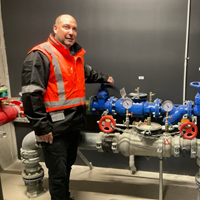
Next dates:
Fri 27 Feb and Mon 2 Mar 2026, Online, Australia
Register here
Fri 1 May and Mon 4 May 2026, Online, New Zealand
Register here
About this Course:
CIBSE ANZ Hydraulic Services Engineering Training is a two-day course that forms part of a building services series of training that CIBSE offers in Australia and New Zealand.
This course introduces Hydraulic Services as a core discipline within building services engineering. It provides an overview of water services and different drainage systems, their equipment as well as an understanding of the legislative requirements that guide the design process.
Who should attend:
This course is suited to:
- Those in the early stages of their hydraulic services engineering career,
- Those with international qualifications looking to understand local design requirements and framework, or
- Those specialising in other areas of the construction and the building services industry, wishing to gain a better understanding of hydraulic services design principles in Australia and New Zealand
DAY 1
1. Introduction Hydraulic Services
- General Introduction to Building Services Engineering
- General Introduction to Hydraulic Services
- What does Hydraulic Services Cover
- What do Hydraulic Consultants Do
- What do Hydraulic Consultants Do NOT Do
- Close Relationships With Civil Engineers
- Basic Components Knowledge
- Valves
2. Stormwater Drainage Systems
- Systems Overview
- Key principles
- Legislation codes and standards
- Key components
- Terms of reference
- Fundamentals of stormwater drainage
- Where to discharge
- How to estimate water flow
- Understanding the function and selection criteria of key components
- How to size key components
- What is onsite detention
- What does water sensitive urban design mean
3. Below Ground Structure Drainage Systems
- Systems Overview
- Key principles
- Legislation codes and standards
- Key components
- Terms of reference
- Fundamentals of below-ground structure drainage systems
- When a sub-surface drainage system is required
- When to drain and when not to drain
- Types of retaining walls and associated drainage systems
- Types of sub-surface drainage systems
- Removal of sub-surface water by pumping
4. Roof Drainage Systems
- Systems Overview
- Key principles
- Legislation codes and standards
- Key components
- Terms of reference
- Roof Types and Drainage Components
- Metal and tiled roof areas
- Catchment area considerations
- Gutter drainage systems and their functionality
- Eaves Gutters and Downpipes
- Key design considerations
- Valley Gutters and Downpipes
- Key design considerations
- Box Gutters and Downpipes
- Key design considerations
- Discharge Pipe Reticulation
- Reticulation methods
- Siphonic Systems
- Key design considerations
- Performance Solutions
- Why are they required
- What are the general considerations and approach
5. Suspended Structure Drainage Systems
- Systems Overview
- Key principles
- Legislation codes and standards
- Key components
- Terms of reference
- System Basics
- Set-downs
- Rainfall Intensity
- Catchment Area
- Flow Rate
- Falls and Slopes
- Fail-safes and Overflow Provisions
- Sub-surface Drainage
- Vacuum Drainage Systems
- Plant
- When vacuum drainage systems are used
6. Rainwater Collection Systems
- System overview
- Key principles
- Legislation codes and standards added to slides
- Key components (pics with notes) eg eaves gutters, rainwater head etc
- Terms of reference
- System basics
- Pre-treatment
- Rainwater Tanks
- Pumps
- Filtration Systems
7. Sanitary Plumbing and Drainage Systems
- System Overview
- Key principles
- Legislation codes and standards
- Network Utility Operator Guidelines
- Key components
-
Design Principles
-
Engineering Principles
-
Common Design Considerations for Sanitary Plumbing and Drainage
-
-
Fundamentals of Sanitary Plumbing
- Overview
- Single Stack (+modified)
- Fully Vented (+modified)
- Positive Air Pressure Attenuators
- Reduced Velocity Aerator Stack
- Additional Design Considerations
-
Fundamentals of Sanitary Drainage
- Overview
- Key Components
- Design Principles
- Design Variations
- Additional Design Considerations
DAY 2
8. Onsite Wastewater Treatment and Onsite Liquid Trade Waste System
- Onsite Wastewater Treatment
- Packaged Treatment Plants
- Effluent Disposal Methods
- Trade Waste – System Overview
- Network Utility Operator and Regulations
- Key Components
- Design Principles
- Additional Design Considerations
- Trade Waste System – Pre-Treatment Systems
- Dry Basket Arrestors
- General Purpose Pits
- Coalescing Plate Separators
- Grease Arrestors
- Dissolved Air Floatation (DAF) units
- pH Correction Equipment
- Access and Cleaning Requirements
9. Water Services
- Systems Overview of Water Services
- Key principles of Water Services
- Key components of Water Services
- Legislation, codes and standards
- Terms of reference
- Basic Understanding of Water and its Chemistry
- What is water
- Chemistry of water
- Fundamentals of Cold Water Services
- Controlling water pressure
- Protection of water supplies
- Overview of Water Chemistry, Contamination
- Water Storage
- Materials
- Fundamentals of Heated Water Services
- Heated water generating plant
- Central circulating systems
- Central non-circulating systems
- Supply and delivery temperatures
- Dead Legs
- Methods to control temperature to prevent scalding
- Pressure management
- Heat loss and insulation
- Balancing and circulation of central circulating systems
- Hard Water
- Non-Drinking Water Services
-
What is a non-drinking water defined as
-
10. Water Hygiene
- System Overview of Water Hygiene
- Key principles of Water Hygiene
- Legislation, codes and standards
- Key components of Water Hygiene
- Terms of reference
- Fundamentals of Water Hygiene
- What does the problem look like to the naked eye
- Situations that affect water hygiene
- Hygiene management
- US research – Root cause
- Organisms
- Components to manage hygiene
11. Fuel Gas Services (New Zealand)
- System Overview of Fuel Gas Services
- Key principles
- Legislation, codes and standards
- Fundamentals of Fuel Gas Services
- Characteristics of Gas
- Typical layout
- Installation rules
- Pipe sizing exercise
- Fluing and ventilation
- Commercial Kitchens
- LPG installations
- Hydrogen, Synthetic methane, Biogas and renewable LPG
12. Getting it Right Onsite
- Sustainability
- Performance Solutions
- Services Co-ordination and Interface Points
- Testing and Commissioning
- Poor Installations
Meet the Trainers:
Thomas Wise

Currently the Technical Director of Fire and Hydraulic at Warren Smith Consulting Engineers. Tom:
- Studied Building Services Engineering and also completed a specialist qualification in Plumbing Engineering.
- Has specialised within the Healthcare sector for Hydraulic Services since 2010 and is known to be a reliable source of current Healthcare design legislation and regulations.
- Has shrewd knowledge of international Plumbing Engineering Standards
- Supports the industry in the art of watershedding within the field of drainage.
- Is involved with many differing working groups and committees since 2020 assisting government develop standards and best practice guidelines.
- Tom is also accredited in the NSW, Act and Tasmania for plumbing services certification.
Nick Fleckney

Nick is a Principal Public Health- Hydraulic Engineer covering a large range of Hydraulic work ranging from airports, hospitals, education, justice buildings, commercial buildings, hotels, multi-story apartments, civil infrastructure works including water treatment stations and backflow prevention throughout New Zealand.
With his trade background as a Registered & Licensed Certifying Plumber, Gasfitter, Drainlayer, accredited Backflow tester & Surveyor plus an accredited industry assessor, Nick has developed and fine-tuned a suite of specialist skillsets that is extremely rare in the professional engineering environment in New Zealand.
Nick is active in the industry when it comes to all things Hydraulics, he is the current chair of the AHSCANZ (Association of Hydraulic Services Consultants Australia New Zealand, has just recently served a 9-year tenure on the Plumbers Gasfitters and Drainlayers Board of New Zealand (the Regulator for the Industry), provides expert witness services and input into government enquiries as and when required.
Click here to watch a recording of the Stormwater Drainage System session of this course.
"Nick was a fantastic presenter and the course he covered was insightful"
"I would recommend this course to those wanting a summary/introduction to the hydraulic engineering field with some prior knowledge. Completing this course will give you an appreciation of what is considered during the design of these systems.
"Tom was fantastic, delivered the information well in a clear and understandable way. He was clearly an expert in the subject matter"
“I have left the course with a better understanding of hydraulic design in particular, but not limited to items such as transient flow and pipe sizing that are often overlooked in the industry." - Zain Khan, Building Services Engineer, Multiplex
"The content was so rich and intense which is great" - Ahmed Elgohary
" I have been in the industry for over 22 years and it is always good to get back to basics and refresh on what has been forgotten in some instances. This course was a great refresher for me, and I even learned something new."
"This course covered all areas of what I would usually work on in projects as a Hydraulics Engineer. Nick was an awesome instructor and I would recommend this course for anyone who is going into hydraulic engineering for Building Services."